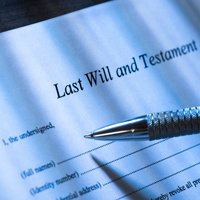 Americans do not want have to think about their own death or plan for it as evidenced by the AARP statistic that two out of every five adults over the age of 45 in the U.S. do not have a will. If you do not plan for what happens to your estate after you are no longer there, in most cases you are leaving those decisions – including what happens to any minor children – up to the state in which you live. The state will appoint an administrator bound by state probate laws to determine what happens to your belongings and assets.
Americans do not want have to think about their own death or plan for it as evidenced by the AARP statistic that two out of every five adults over the age of 45 in the U.S. do not have a will. If you do not plan for what happens to your estate after you are no longer there, in most cases you are leaving those decisions – including what happens to any minor children – up to the state in which you live. The state will appoint an administrator bound by state probate laws to determine what happens to your belongings and assets.
A will is a legal document that manages what happens to your estate after your passing. It determines who the beneficiaries (those who will inherit your property) are and what they will receive from the estate. If you have minor children or dependents, a will also designates a guardian for them in the event of your death. Having a will clarifies all of these issues and can save your heirs a great deal of time and money. It can also bring peace of mind to know that your affairs are in order should anything ever happen to you.
Other issues addressed by a will include:
- Funeral arrangements and burial instructions
- Gifts to charity or other philanthropic organizations
- Naming an executor – the person who will carry out the stated wishes of your will
The executor can be your spouse, a friend you trust, an adult child or another relative. You can also name joint executors. If you have a large and complicated estate you may want to name an attorney or someone with in-depth legal and financial knowledge as executor. It is important that the will gives the executor the power to pay any outstanding bills from the estate and deal with debt collectors.
Joint vs. Separate Wills
Joint wills for couples are not recommended, rather most estate planners find it makes more sense to have separate wills. One reason for separate wills is that some states do not recognize joint wills. Another is that it is unlikely that both spouses die at the same time. Separate wills allow each spouse to address any previous relationships and children, or property acquired before the current marriage. Anyone dealing with blended families should be very specific because in most cases the court will favor the current spouse.
Witnesses
You will need a witness for your will who should not be the lawyer drafting your will, or any of the beneficiaries of the will as that creates a conflict of interest. In some states two or more witnesses can be required.
Updating a Will
Major life changes such as marriage, divorce, the death of a spouse, and inheritance are reasons to review and amend your will. The most current valid version at the time of your death is what will be executed.
There are other estate planning tools besides wills available such as trusts. The advice of an experienced estate planning lawyer can be invaluable in investigating every option to make sure your assets are protected and distributed according to your wishes.
Delaware County Wills and Estates Lawyers at Eckell Sparks Help Clients Draft Detailed Wills
At Eckell, Sparks, Levy, Auerbach, Monte, Sloane, Matthews & Auslander, P.C., we have the knowledge and experience to help you and your family plan for the future. Call 610-565-3701 or contact us online to schedule an appointment with a skilled Delaware County wills and estates lawyer. From our offices in Media and West Chester, Pennsylvania, we serve clients throughout Chester County, Delaware County, and the greater Philadelphia area.

